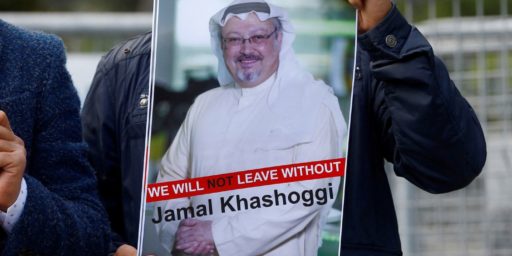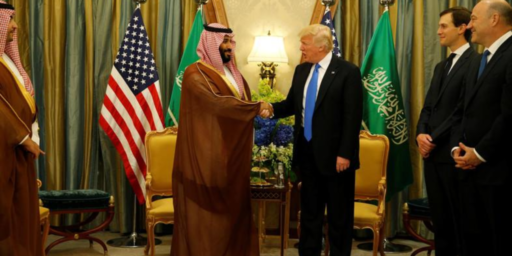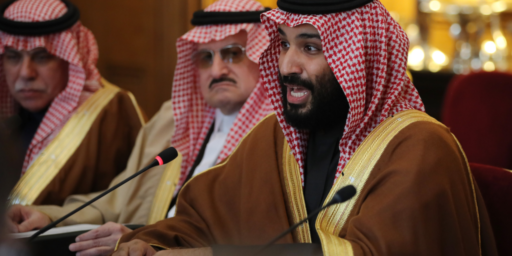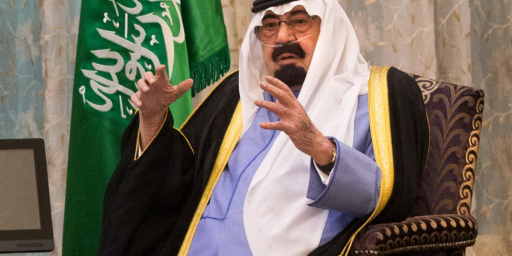Saudi Arabia’s 9/11
Fareed Zakaria has an interesting piece in Newsweek, “The Saudi Trap,” examining Saudi Arabia’s terrorist crisis and what it portends for that state’s future.
The images of a beheaded Paul Johnson are gruesome, but for Saudi Arabia, it has been more than a year of grim images. It started on May 12, 2003, when three cars packed with bombs exploded in a residential compound in Riyadh, killing 35 people and wounding 200. Since then, there have been at least 20 terror attacks or clashes between Saudi police and Islamic militants. Most brazenly, four gunmen entered a residential compound for oil-industry workers in Khobar last month and killed 22 people. Does this turmoil mark the beginning of a civil war in Saudi Arabia? Could jihadis get control of the most powerful oil-producing nation and use its vital resource as a weapon against the modern world they so despise?
In search of answers, I traveled through Saudi Arabia last month, talking to princes, preachers, businessmen and dissidents. Many of the Saudis I met were defensive about the country’s problems, angry with American foreign policy and enraged about the “demonizing” of Saudi Arabia. “Let me be honest: 9/11 meant nothing in Saudi Arabia,” a young writer, Mshari Al-Thaydi, told me. “Some didn’t believe that any Saudis were involved in it; others thought it was a conspiracy or was deserved because of America’s support for Israel or whatever.” But the more recent attacks—particularly the May 12 bombings—shook people out of their complacency. “May 12 was our 9/11,” said Al-Thaydi. “Since then Saudis have had to recognize that Al Qaeda is not a fantasy. It is here.”
After years of inaction and obfuscation, the regime is beginning to move forcefully. Saudi officials believe that the killing of Abdelaziz al-Muqrin, the leader of the group that murdered Johnson, will stop much of the domestic terror. “His group, with 50 to 60 members, was the one that planned almost all recent attacks,” said one official. “It’s now leaderless.” The killing of Muqrin and three other wanted militants, this official argues, is the culmination of months of similar efforts. “It is because the regime has begun fighting these terrorists that they have been lashing out in response,” he said. Nawaf Obaid, a Saudi government consultant, claims that the kingdom’s security spending is up 50 percent over the past two years, to $5.5 billion.
The recent attacks within Saudi territory have clearly created a new sense of urgency among the al Sauds. Certainly, they have been at odds with bin Laden for over a decade and have even tried, numerous times, to assassinate him. But the Saudi monarchy has, since its inception, been the world’s foremost sponsor of the Islamist cause, spreading the virulent Wahhabi strain around the globe. While Iran has been the chief sponsor of international terrorism since the mullahs took over in 1979, they did so on a playing field created by the Saudis.
But there are many who believe that the regime is not acting decisively enough. One of them is Saudi Arabia’s own ambassador to Washington, Prince Bandar bin Sultan. In a surprisingly forceful article in the reformist Saudi newspaper Al-Watan, Bandar argued that neither Saudi society nor the state had fully mobilized itself for this struggle. “War means war,” he wrote. “It does not mean Boy Scout camp.” He urged that people stop calling the militants “good people who were careless” and call them instead “terrorists and aggressors with whom there can be no compromise.”
It is not at all clear that the Saudi royals can buck the imams and survive, and making war on al Qaedi without alienating the imams is a neat trick indeed.
Why doesn’t the regime take on the religious establishment more frontally? There is little danger that it would lose. Between state and mosque, there is really no contest. Every imam in the country is on the government’s payroll; every religious scholar, judge and teacher is a salaried government employee. There is no Vatican here, no independent authority like the pope. And yet the regime is extremely cautious about clipping the wings of these bureaucrats.
***
Tales of corruption in Saudi Arabia are not new. Corruption dominates and distorts the entire Saudi system; some estimate that 25 percent of Saudi GDP goes toward the support of the royal family and its patronage networks. Members of the royal family repeatedly pointed out to me that Al Qaeda attacks it not because they are corrupt or undemocratic but because they are regarded as secular and pro-American. Perhaps this is true, though I was struck by the number of Islamist Web sites that detail the extravagance of the royal family, and also by the number of ordinary Saudis who mentioned it to me. In that secret poll done by the government, corruption was ranked the No. 1 issue on people’s minds.
But the reason corruption is so debilitating for Saudi Arabia today is this: the only way to effectively take on religious extremism—whether by terrorists or government clerics—is for the government to have its own source of credibility. And you earn authority in the modern world through good, clean, responsive government. “The fear is that if they take on the religious folk, the imams will stop preaching about infidels and start talking about decadence,” said a journalist who asked not to be named.
Ironically, however, Osama has been talking about Saudi decadance for years.






I get the sense that the Saudis are having a sort of Martin Luther Ninety-Five Theses moment.